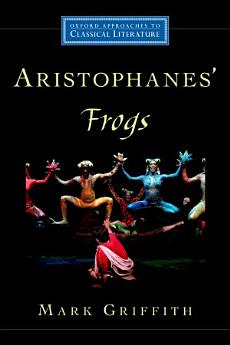Aristophanes' Frogs
Mark Griffith
एप्रि २०१३ · Oxford University Press
ई-पुस्तक
320
पेज
family_home
पात्र
info
reportरेटिंग आणि परीक्षणे यांची पडताळणी केलेली नाही अधिक जाणून घ्या
या ई-पुस्तकाविषयी
Aristophanes is widely credited with having elevated the classical art of comedy to the level of legitimacy and recognition that only tragedy had hitherto achieved, and producing some of the most intriguing works of literature to survive from classical Greece in the process. Among them, Frogs has a unique appeal; written and performed in 405 BCE, the comedy won first prize in that year's Lenaea festival competition and was re-performed soon thereafter--a rare occurrence for comedies at the time. Frogs has been admired and quoted by readers and critics ever since, a testament to its timeless appeal; it remains among the most approachable of Aristophanes' plays, as well as perhaps the richest of all in insights it provides into ancient Greek cultural attitudes and values. Mark Griffith's study of the Frogs is the first single book to offer a reliable and sophisticated account of this play in light of modern notions of culture, performance, democracy, religion, and aesthetics. After placing the work in its original historical, cultural, and biographical context, Griffith goes on to underscore the originality of Frogs in relation to parallel developments in the tragedies of Aeschylus and Euripides, among others. He highlights the play's unique portrayal of the figure of Dionysus, the Eleusinian mystery cult, and the question of life after death. This title provides not only a detailed analysis of the play and a concise account of its reception, but also a succinct introduction to ancient Greek comedy, exploring the extraordinary range of theatrical conventions, moral and aesthetic assumptions, and religious beliefs that underlie the action of Aristophanes' play. The book provides an invaluable companion to Aristophanes and the theater of classical Greece for students and general readers alike.
लेखकाविषयी
Mark Griffith is Klio Distinguished Professor of Classical Languages & Literature at the University of California, Berkeley.
या ई-पुस्तकला रेटिंग द्या
तुम्हाला काय वाटते ते आम्हाला सांगा.
वाचन माहिती
स्मार्टफोन आणि टॅबलेट
Android आणि iPad/iPhone साठी Google Play बुक अॅप इंस्टॉल करा. हे तुमच्या खात्याने आपोआप सिंक होते आणि तुम्ही जेथे कुठे असाल तेथून तुम्हाला ऑनलाइन किंवा ऑफलाइन वाचण्याची अनुमती देते.
लॅपटॉप आणि कॉंप्युटर
तुम्ही तुमच्या काँप्युटरचा वेब ब्राउझर वापरून Google Play वर खरेदी केलेली ऑडिओबुक ऐकू शकता.
ईवाचक आणि इतर डिव्हाइसेस
Kobo eReaders सारख्या ई-इंक डिव्हाइसवर वाचण्यासाठी, तुम्ही एखादी फाइल डाउनलोड करून ती तुमच्या डिव्हाइसवर ट्रान्सफर करणे आवश्यक आहे. सपोर्ट असलेल्या eReaders वर फाइल ट्रान्सफर करण्यासाठी, मदत केंद्र मधील तपशीलवार सूचना फॉलो करा.





